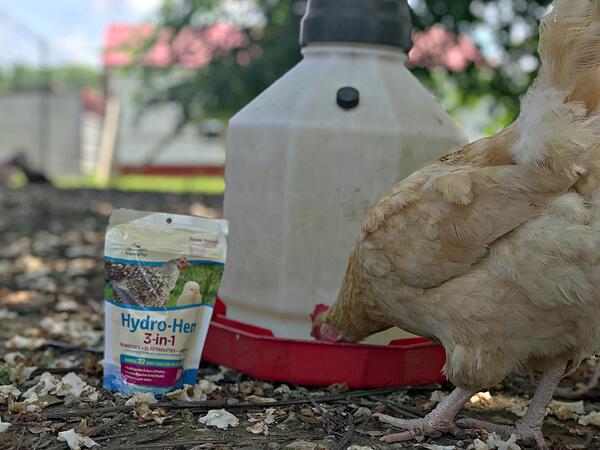Posted by Amanda Terbrock, Mon, Jul 29, 2019

Hello again, friends! Summer is here and temperatures are rising! I’d like to share with you some of the adjustments we’ve made to our backyard chicken care routine this summer to help them beat the heat.
- High-Quality H20. We use Manna Pro® Hydro-Hen™ to provide adequate hydration for our lovely ladies during the hot summer. While you can use Hydro-Hen year-round, I highly suggest using this 3-in-1 supplement during the summer since it includes electrolytes, acidifiers, and probiotics for digestive health and hydration. In addition to providing proper hydration, be sure to check water levels one to two times a day. Due to the heat, I’ve also noticed some algae growth in the water. Make sure you have a designated sponge or scrub brush with which to routinely clean your waterer each time you change the water.
- Corn-Sicle. We all love frozen treats during the summer, and chickens are no exception! We like to make our backyard flock a simple homemade corn-sicle by combining water with a can of corn and freezing the mixture in a standard ice cube tray. The cool ice on the frozen corn helps keep the ladies cool and gives them something fun to do!

- It’s Getting Hot in Here. We keep all of our chicken coop windows and doors open during the day for good ventilation. In addition, we keep a fan in the chicken coop to keep air moving. It’s also important to ensure that chickens are not crowded. The University of Missouri Extension recommends that each full-grown chicken have about two feet of floor space for home flocks. We have four chickens in a 10'x10' chicken extension attached to the coop that provides enough space for them to move about freely during the day until we can let them out into the yard.
- Throw Some Shade. Shade is very important! Chickens need to have shaded areas in which to take refuge from the sun when they’re not in the chicken coop. When building our chicken coop, we added a sunshade roof to the extension to provide shade for our chickens when they’re not inside the coop building. Trees can also be a good source of shade.
- Monitor Temperatures. Taking preventative measures such as providing shade and ventilation are all ways to help lower the temperature of the coop; however, it’s important to keep thermometers inside both the chicken coop and the chicken run to monitor the actual temperature and the birds’ risk of heat stress. We now have a digital thermometer that we can read in the house, so we conveniently don’t have to go outside but are able to keep a close eye on it.

- Egg Production. There are many reasons why egg production can be adversely affected. Heat stress is one factor that can negatively affect egg production, but there are ways to help manage the environment. As we’ve mentioned, providing ventilation and shade along with ample clean water is very important. In addition, the University of Missouri Extension advises storing feed away from heat, direct sunlight, and moisture to help prevent nutritional deficiencies and disease, which can also contribute to lower egg production. Monitoring hens for signs and symptoms of heat stress and maintaining proper care are important when it comes to maintaining egg production in hot weather.
- Signs and Symptoms of Heat Stress. Hens do not sweat. Instead, they release heat via respiration or light panting. The University of Arizona Cooperative Extension explains that signs of light to moderate heat stress in hens include panting more heavily and holding their wings away from their body. When this occurs, hens should be moved to a cooler area with shade and water. Hens in danger of heat exhaustion will pant heavily, hold their wings away from their body, and may become lethargic or limp. According to the University of Arizona Extension, these signs and symptoms call for immediate action, such as putting the hen’s body (not her head) in cool water and then placing her in a cool, inside location until she has recovered.
While summer is nothing to fear with backyard chickens, it can pose some unique challenges that can be prevented with proper management and care. I hope you learned some helpful information today that will assist you in maintaining your chickens’ health this summer. Until next time!






